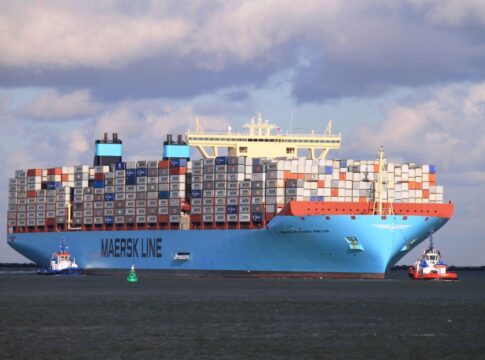In a strategic response to geopolitical tensions, European container shipping giants A.P. Moller Maersk A/S and Germany’s Hapag-Lloyd AG have announced plans to alter their traditional transit routes, bypassing the Red Sea and opting for the longer route south of Africa. This decision, set to take effect in February 2025, is a direct reaction to the security threats posed by Houthi rebel attacks in Yemen. Such a shift in maritime logistics is not just a tactical maneuver but a move with broader economic impacts, particularly concerning global trade costs, inflation, and economic stability.
Historically, the Red Sea has served as a crucial maritime corridor, channeling approximately $1 trillion in trade each year. However, recent disruptions have led to a significant 56% decrease in vessel transits, as reported by MarineTraffic. This rerouting decision reflects an expectation that these disruptions will continue to affect shipping lanes well into the coming years. The new route, around the Cape of Good Hope, while ensuring the safety of shipments, extends travel time and increases operational costs for shipping companies.
Economic Impacts on Global Trade
- Increased Shipping Costs: The longer route will inevitably lead to higher fuel consumption, increased transit times, and subsequently, higher shipping costs. These costs may be passed down the supply chain, leading to increased prices for consumer goods.
- Inflationary Pressures: As shipping costs rise, so too do the prices of goods. This cost-push inflation can contribute to overall inflationary trends, affecting purchasing power and potentially leading to increased interest rates as central banks attempt to manage inflation.
- Supply Chain Disruptions: The rerouting could result in delays and further disruptions in global supply chains that are still recovering from the impacts of the COVID-19 pandemic. Industries reliant on just-in-time delivery systems may face shortages, impacting production timelines and inventory levels.
- Market Volatility: Uncertainty in shipping routes and costs may lead to volatility in global markets. Investors might react to these uncertainties, influencing stock prices, particularly in sectors heavily dependent on international trade.
Broader Economic Developments
– Energy Markets: With increased demand for fuel to cover the extended journey around Africa, there could be upward pressure on oil prices. Higher energy costs feed into broader inflationary pressures, affecting everything from transportation to manufacturing.
– Regional Economic Shifts: Countries along the new route, such as South Africa, may experience increased economic activity, potentially benefiting from additional port fees and related services. However, this could also strain existing infrastructure, necessitating investments in port and logistics capacities.
– Adaptation and Innovation: Companies may accelerate their efforts to optimize shipping efficiencies and explore alternative energy sources to mitigate increased costs. This could spur innovation in maritime technology and logistics management.
The decision by Maersk and Hapag-Lloyd to reroute their vessels is a microcosm of the intricate interplay between geopolitical stability and global economic health. While this move addresses immediate security concerns, it underscores the vulnerability of global trade networks to regional conflicts. The ripple effects on costs, inflation, and economic stability will require adaptive strategies from businesses and policymakers alike, highlighting the need for resilient supply chains and innovative solutions in an ever-evolving global landscape. As the world watches these developments, the maritime industry will continue to play a pivotal role in navigating the complexities of international trade amidst changing tides.


